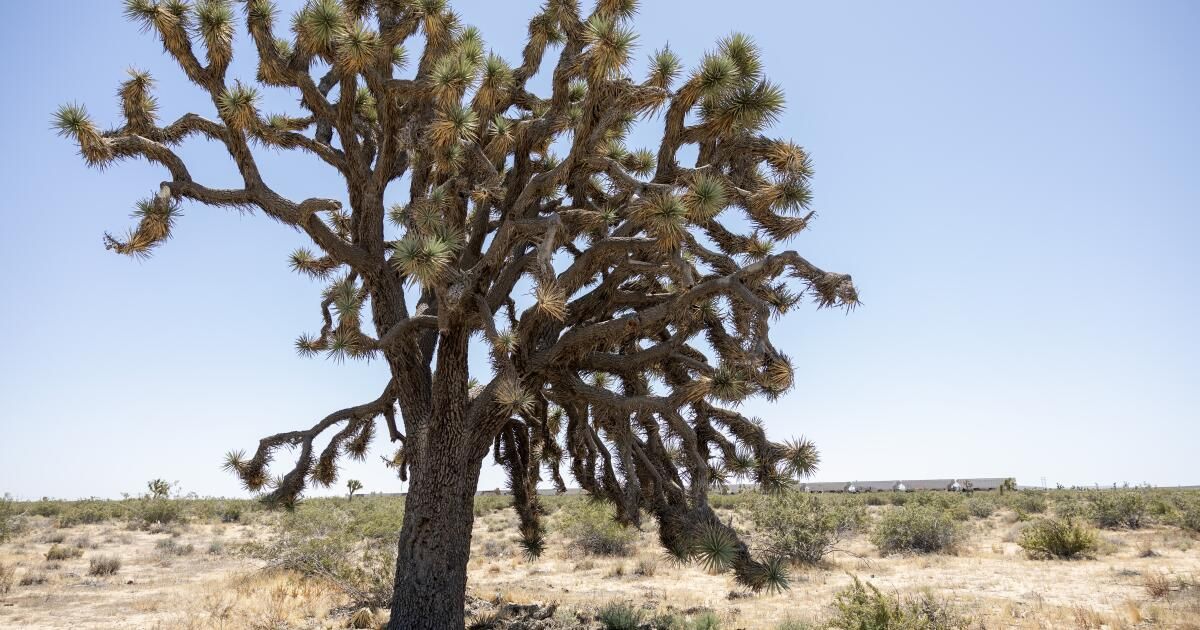It's been a while since we've had this much outpouring about something that has nothing to do with Donald Trump: Dozens of readers wrote letters to the editor expressing dismay over the construction of a solar energy project in the Mojave Desert, the Times's Melody Petersen reported: that requires the destruction of 3,500 Joshua trees.
This is understandable. Joshua trees mark the desert southwest in a way that perhaps only the saguaro can match. Existing within a specific elevation window of the Mojave Desert, a window that is closing due to climate change, the plants act as a kind of unmistakable natural border between metropolitan Los Angeles and the high desert. Who doesn't notice the first Joshua tree they see when leaving Los Angeles on Cajon Pass or Highway 14?
But we have moved far enough along the climate change path that we must now consider trade-offs, and this is one of them. Humanity must reduce its carbon emissions, solar energy helps us get there, and there are fewer better places to generate solar energy than the sun-drenched Mojave Desert. Readers who advocate for the survival of Joshua trees suggest alternatives such as more urban rooftop solar and conservation.
This is not the first environmental compensation that has been made in the battle against climate change. My hope is that the Joshua tree does not end up alongside the grizzly bear as an iconic California species that has been exterminated.
————
To the editor: The photo of a 150- to 200-year-old Joshua tree with your article on the Aratina Solar Project made my throat seize up.
Why don't the 180,000 homes in the coastal neighborhoods that will receive the energy install solar panels on their roofs? I have solar on the roof and it does not detract from the beauty of my home. Why are threatened Joshua trees and endangered desert tortoises sacrificed for homes so far away?
The well-being of the citizens of Boron and adjacent small towns will also be sacrificed for the benefit of wealthier neighborhoods. Why is the discovery of a toxic fungus in the soil ignored?
This is not “saving the planet.” I believe in expanding renewable energy sources, but the quick fix (bulldozing, crushing and clearing a large section of land for homes miles away) is lazy and thoughtless.
Rooftop solar is the answer.
Starflower Thomson, Joshua Tree, California.
..
To the editor: Most of us environmentally concerned people in the desert southwest knew from the beginning that this “save the planet” ethos was only going to go as far as NIMBYism and corporate greed would allow.
A Northeastern environmentalist who would be horrified at the clear-cutting of trees in a forest would not be as moved by the mass destruction of cactus habitat in the California desert.
An ecologically concerned resident of grizzly bear country isn't going to be apoplectic over the elimination of rattlesnake or turtle habitat in Arizona.
Too many Americans view the desert as a wasteland. Why do you think they built and tested nuclear weapons in New Mexico?
Destroying Joshua trees apparently to serve a greater good is immoral. It is a failure to recognize that the California Public Utilities Commission (CPUC) is not protecting the public and that we have many habitats already developed (and therefore destroyed), primarily in urban areas, that are not used for energy production.
We need to incentivize rooftop solar so homeowners and others can afford the costs of solar installation. Why exactly does the CPUC exist?
Denys Arcuri, Indian
..
To the editor: Joshua trees, in fact most trees, deserve to be saved. So do desert animals.
But let's be clear: if we hope to slow and eventually stop global warming, we must stop burning fossil fuels and transition to clean, renewable energy generated by wind, water and the sun.
Building solar farms wherever we can is aimed at saving humans, not killing trees or desert creatures. The planet will survive global warming; Humans will not do it.
Fortunately, scientists at Stanford University have created renewable energy roadmaps for all 50 states and, to date, more than 150 other countries to guide the world in the transition. It's time to welcome clean energy infrastructure, not oppose it.
Cort Casady, Palos Verdes Peninsula
..
To the editor: I don't think destroying a natural habitat to provide electricity to humans is a good trade-off. Conservation could be another way forward.
Joshua trees and desert dwellers (including humans) also have a right to exist. Plus, as time goes by, we humans (8 billion of us) may end up missing out on everything this beautiful planet of ours has to offer.
John Muir had a lot to say about the importance of nature to the human soul. For example:
“The battle we have fought and continue to fight for the forests is part of the eternal conflict between good and evil, and we cannot hope to see its end. …So we should count on watching and fighting for these trees, and we should always be glad to find something so good and noble to fight for.”
Erica Hahn, Monrovia
..
To the editor: When you walk through Scotland and Germany, two of the least sunny places on the planet, the ubiquity of rooftop solar installations is almost shocking. How is this possible?
They take climate mitigation personally. California obviously doesn't.
Here in sunny California, where there are thousands of acres of rooftops waiting to be solarized, private capital gets the go-ahead to destroy a pristine desert area with endangered plants and animals and only poor, powerless people as neighbors.
A private equity developer is about to build this massive solar facility to serve wealthy coastal areas, and we're going to let that happen? What's wrong with this state?
No more massive solar projects should be built until the solar potential of each rooftop has been exhausted, right where the energy is needed.
Sara R. Nichols, Los Angeles
..
To the editor: As the late Huell Howser explained years ago, it is not just the Joshua tree that is in danger, but the habitat it provides for desert reptiles, insects, birds and small mammals.
Can't find another site for the proposed solar plant? We need clean energy, but Joshua trees take many years to grow and proliferate.
If it were just a few trees, that might be acceptable, but destroying thousands seems like a crime.
Kathleen Trinidad, Acton
..
To the editor: Members of the Kern County Board of Supervisors should be ashamed of themselves and removed for approving the for-profit project that will destroy old-growth Joshua trees and protected wildlife habitat.
Who is the private equity firm building the plant to claim that the benefits outweigh this horrible desecration of our natural treasures? The fact that he plans to shred trees on site to avoid visibility and backlash demonstrates the nefarious nature of this project.
This type of development should not be part of California's path to clean energy and the project should be stopped immediately.
Peter Fennema, West Los Angeles












